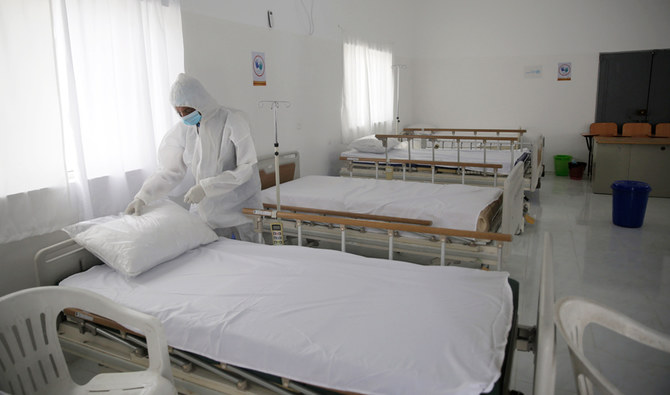AL-MUKALLA: Yemen’s prime minister has urged people to band together to prevent the spread of coronavirus in the war-torn country, stressing that with its poor health facilities it cannot confront the virus on its own.
Maeen Abdul Malik Saeed said in a televised speech on Monday that his government was forced into shutting down airports, land crossings and schools to prevent the COVID-19 virus from sneaking into the country.
He appealed to Yemenis to set aside their differences and focus on his government’s precautionary measures. “Although no case has been registered, we must not underestimate or deal carelessly with the gravity of the diseases. We must come together to achieve the preventive measures and get ready for the pandemic,” he said.
Yemen’s government has recently closed schools for one week, grounded planes and deployed 11 heath teams at sea, land and air entry points to test arrivals. The prime minister said that as many as 50,000 Yemenis who have returned since Jan. 18 have been tested for the virus, which consumed all the virus tests in the country’s stocks. “We are counting a lot on support from the King Salman Humanitarian Aid and Relief Center (KSRelief) and the World Health Organization (WHO) to overcome this pandemic,” Saeed said.
Early this year, the Iran-backed Houthis imposed a ban on recently printed banknotes, sparking a series of crises, including a severe cash crunch. Local exchange companies that disperse government salaries inside Houthi-controlled territories said they could not pay due to limited cash.
The prime minister urged the Houthis to scrap their ban to allow the government in Aden to lifeline funds to health facilities in Sanaa and other provinces in northern Yemen.
HIGHLIGHTS
• The government has been forced into shutting down airports, land crossings and schools
• Yemenis urged to set aside their differences and focus on the precautionary measures.
• As many as 50,000 Yemenis who have returned since Jan.18 have been tested for the virus.
On Tuesday, Yemen’s minister of sports Nayef Al-Bakri suspended all sports activities to prevent the spread of the virus. The country’s judiciary authority also suspended the work in courts.
Yemen’s deputy prime minister and the head of government’s emergency committee that is handling the outbreak of coronavirus Salem Al-Khanbashi told Arab News on Tuesday that the committee will convene with the government on Saturday to review the progress of preventive measures, adding the country might allow students to return to schools for final examinations.
“We are meeting on Saturday to listen to recommendations from health authorities. We might be sending back general education students to schools to sit for final examinations since there are no cases,” Al-Khanbashi said.
He added that the government might also ban large gatherings and ask people to stay at home. “We will take decisions based on health officials’ recommendations,” Al-Khanbashi said. The deputy prime minister stated that new equipment and tests from KSRelief and the WHO arrived in Aden on Tuesday.
Despite the government’s appeal for unifying efforts to confront the diseases, Houthis have intensified drone, missile and ground attacks on troops in the central province of Marib and the northern province of Jawf. Yemen’s Ministry of Defense said on Tuesday that fierce fighting broke out in Serwah and Khab in Marib and Sha’af in Jawf.













